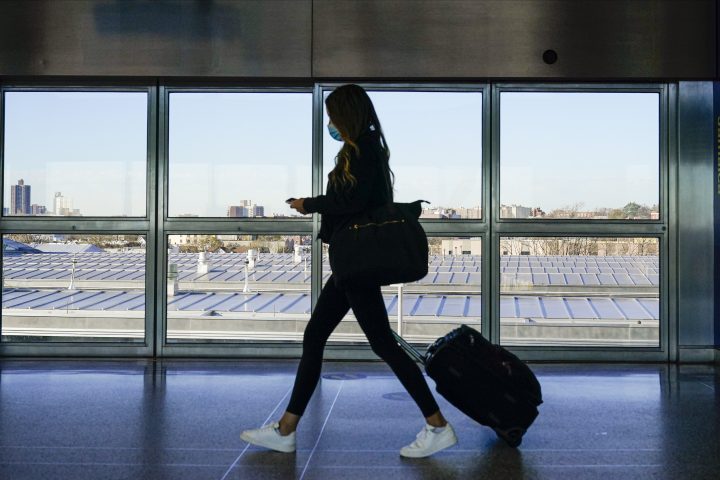Less than one per cent of travellers who have received a fine for failing to go to a COVID-19 quarantine hotel have tested positive for the virus, the Public Health Agency of Canada says.

In an email to Global News, PHAC said as of May 26, of the 1,130 travellers that have received a fine for not going to one of the government authorized accomodation (GAA) — known as quarantine hotels — fewer than 10 have tested positive for the virus on either their day one or day eight test.
That means less than 0.88 per cent tested positive for the novel coronavirus on either test.
In February, the federal government implemented more stringent rules for travellers returning to Canada.
Currently, anyone who enters Canada by air has to stay at a GAA for three days, and must provide proof of a negative COVID-19 test taken 72-hours before their departure.
Travellers must foot the bill for a stay at a GAA, which could cost as much as $2,000.
They must also undergo a 14-day mandatory quarantine.

Travellers who enter Canada through the land border are not required to stay at a GAA, but must quarantine for 14 days, and take a test for COVID-19 on day one and day eight of their quarantine.
The Public Health Agency of Canada said it “ensures all travellers arriving by air have a government authorized accomodation (GAA) reservation,” and “follows-up with all travellers that have a reservation but fail to check-in to their hotel.”
PHAC said it also seeks support from police “for enforcement of non-compliance, as appropriate.”
The federal government has, for months, been urging Canadians to avoid all non-essential travel.

Get daily National news
However, according to data released by the Canada Border Services Agency, between March 21, 2020 and May 30, 2021, a total of 13,287,143 travellers entered the country.
Of those, 10,671,487 entered by land, while 2,615,656 arrived by air.

PHAC said it ensures travellers are compliant with the Quarantine Act, “regardless of their mode of entry,” adding that the agency makes over 20,000 verification calls, and over 4,000 in-person compliance verification visits daily.
The agency said it tracks travellers arriving by air and land that have not completed their testing “regardless of the reason,” in order to “bring them into compliance with the testing requirements.”
PHAC added though, that it does not track the reason provided for not having completed the test.
Are GAAs still necessary?
Last month, an expert advisory panel issued new recommendations to the federal government.
The panel said the current requirement that all air travellers must quarantine in a GAA “should be discontinued.”
In the report, the advisory panel said the GAAs were “expensive” and “inconsistent” with the incubation period of the virus. The report also noted that the stay was not equally applied to travellers over land or air, and people could potentially bypass it by paying a fine.
The panel also made a number of recommendations based on the vaccination status of travellers, with more stringent measures advised for those who have not received their shot, but that would see restrictions eased for those who are vaccinated.
Dr. Isaac Bogoch, an infectious diseases faculty member at the University of Toronto — who was also a member of the expert advisory panel — told Global News that it’s “either time or will very soon be time to have our border policy evolve to keep up with the growing number of Canadians that are vaccinated.”
Bogoch said ultimately it is up to the federal government to decide when to make changes to the measures at the border, but said he hopes they are made sooner, rather than later.
“We have more and more Canadians with a first (vaccine) dose; more and more Canadians with the second dose and cases plummeting in Canada,” he said.
According to Vaccine Tracker Canada by Sunday afternoon, 61.12 per cent of the Canadian population had received at least one dose of a COVID-19 vaccine, while 7.38 per cent were fully vaccinated.
Bogoch said “obviously” we can’t “just flip a switch and go back to what things were like in 2019.”
“But if you look at the proposed suggestions for updated policy, I think it really fills a gap during an interim period where COVID is still a public health risk, but more and more Canadians are having a first and second dose,” he said.

Bogoch said Canada “can’t throw caution to the wind,” the policies in place now can be adapted to reflect the current risk.
“And that current risk is still shrinking in Canada because of the vaccine rollout and because the cases are coming down right now,” he said. “So you can adapt the policy to address, and I don’t think you need to have quarantine hotels anymore, for example.”
-With files from Global News’ David Lao









Comments
Want to discuss? Please read our Commenting Policy first.